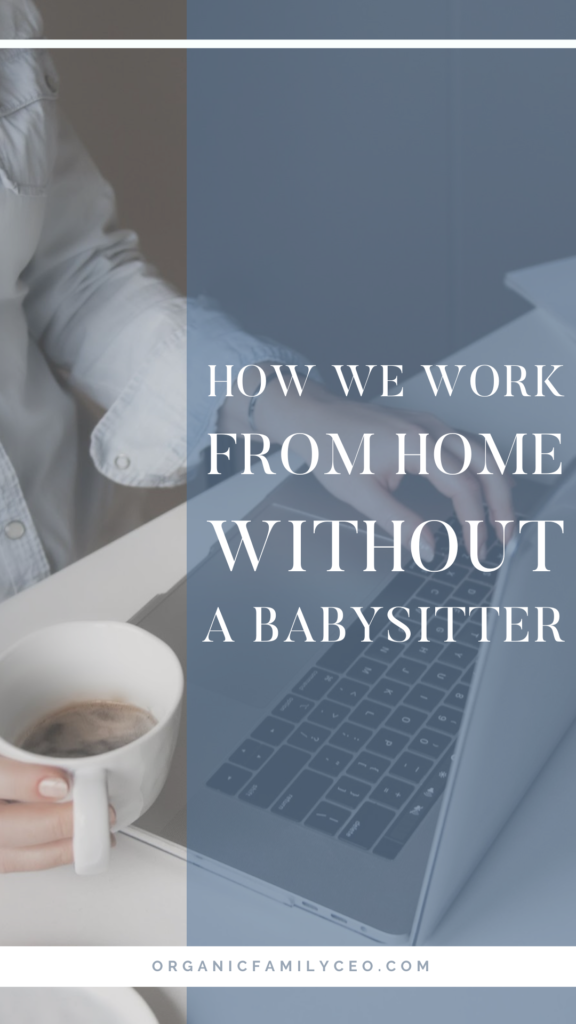Outsourcing childcare if you are full-time working parents makes perfect sense. It’s not, however, the only option out there.
Today, we’re going to tell you about the childcare arrangement that works for us. Our arrangement may or may not work for your family, but we’re sharing this here because we get asked all the time “why in the world don’t you hire a babysitter?”
Although logical in theory, hiring a babysitter is not the path we chose to take. In our family, Courtney is the full-time homemaker + caregiver.
We’re sharing 3 of the many reasons why we’ve made this decision for our family. Use this post to see if our setup is something you would want to try on for your family setup.

During Kev’s 9-to-5 corporate work hours, Courtney is the homemaker + full-time caregiver.
We’ve made this decision strategically for a few reasons:
No. 1 — Focus: Single-Focus Improves Work Quality
Every time a focused human brain gets interrupted, it takes about 20 minutes to recalibrate that focus.
This means that multitasking is one of the worst “productivity” efforts ever. There’s a statistic floating around that multitasking reduces productivity by up to 40%.
We don’t ever want to be starting out working with only a 60% quality focus available. Kids interrupt our sleep + focus enough all on their own without us adding that challenge on to ourselves!
With this in mind, we prioritize doing one task well whenever we take intentional action.
When Courtney is with the kids, she’s with the kids. When Courtney is working on one of her businesses, she’s all-in with that single focus. There’s no divided focus + that yields the most productive “work” in either setting: the most productive bonding experience with the children or the most productive building experience with the business.
No. 2 — Time Management: The Pareto Principle
Some might say that we’re leaving money on the table by not hiring a babysitter + “allowing” Courtney to also work a 40-hour workweek alongside Kevin.
While logical, however, we’ve found that to not be true for our family.
First, there’s no “allowing” here at all. We decide together.
When Courtney’s workweek is condensed into one solid Saturday, for example, her time is bound.
According to the Pareto Principle, which states that 80% of our results comes from 20% of our efforts, this time-binding is an opportunity for massive results when well-executed.
In order to make her 20% effort the most effective, Courtney has to identify exactly what is a must-do by her + what is available for outsourcing to hired help. She’s also become next-level effective at setting + maintaining boundaries.
At strategic checkpoints during the week, Courtney is keeping a birds’ eye view on the overall business direction. She always has a pulse on the business, even when she’s not in the business daily.
This practice allows Courtney to step into a more structured, effective workday that’s worth the effort + time away from the family.
No. 3 — Bonding With the Children: The Emotional Return on Investment
We got into entrepreneurship because we knew that we wanted to call the shots in our own careers + we wanted purposeful paychecks that could support our children well someday.
And when the time came to have children, we knew that we were going to need to consider childcare options if we were going to maintain our full-time work hours.
Here was the kicker: why would we want to earn a bigger paycheck to support our kids only to use that extra money to pay a babysitter to take care of them while we worked for more money?
It felt like extra steps for a result that felt second-best.
We wanted to support our kids as MOM + DAD.
We wanted to be the memory-makers. The bath-givers. The mixing-cookies + singing-into-spatulas bakers. The boo-boo kissers. The on-the-way-home-from-the-playground puddle jumpers.
We asked ourselves: If we turned around 30 years from now with a successful suite of businesses + solid financial wealth, what would we want to buy?
“We’d probably want to buy back all the time we’d missed in those younger child-raising years.“
If you’re in the middle of that high-touch, big-energy, constantly-changing parenthood, then you might agree that as whiplashing as these days can feel with littles, they’re fleeting all too fast.
We know someday we’re gonna miss this.
And so we’re going to lean in for the emotional return on investment right now.
What’s a beach house on the water with no well-bonded kids coming to visit it?
What’s the ability to adventure around the world offering all-expenses paid with no kids who want to adventure with you?
The bonding process with our children starts immediately at birth + is intensified in those “under 7” years.
Here’s the hard truth:
“By the time kids are 12, we’ve already burned over 75% of our parenting time with them!“
For us, if Kev would be the focused, action-taking paycheck earner for that 9-to-5 workweek, then you best believe that Courtney would be JUMPING at the opportunity to be the best involved childcare-giving parent during those hours.
With this mentality + intentional choice, there’s no working dad guilt attached. There’s no mom “leaving her education on the shelf”.
There’s an emotional return on investment for both of us: knowing that one of us parents is always present for our kids when the other steps away to make that purposeful paycheck + that the most critical bonding times in our family are being supported by the person who can do the job best.
That’s an emotional return on investment like no other.
Now, we’re asking you what we had asked ourselves:
If you turned around 30 years from now with a successful suite of businesses + solid financial wealth, what would YOU want to buy?
How could you move more in that direction today?
Share your thoughts with us + other like-minded parent entrepreneurs in our free community!
